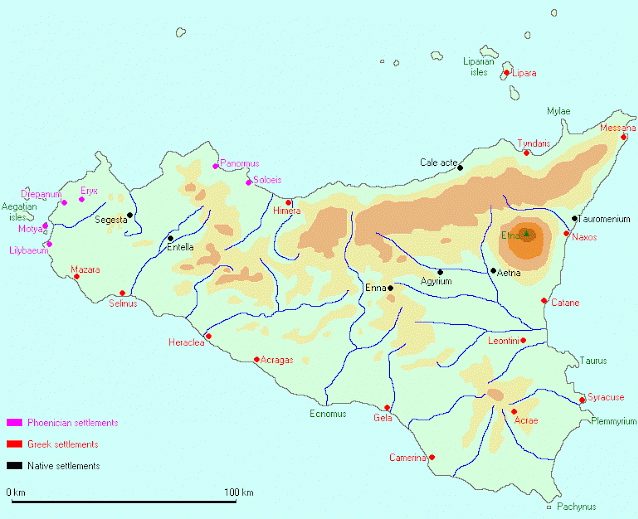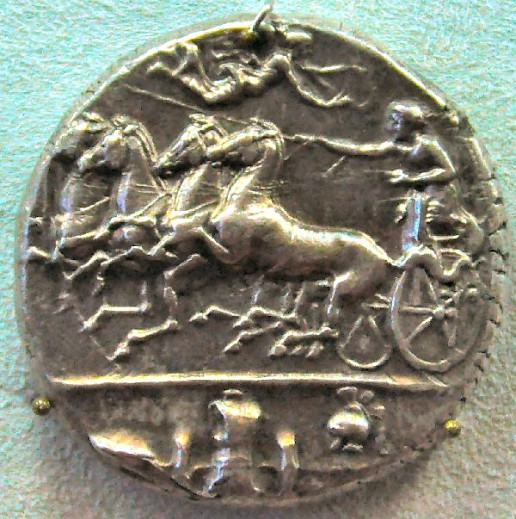Hermocrates
Hermocrates (†407 BCE): Syracusan democratic politician who played an important role in the Peloponnesian War.

Hermocrates, the son of Hermon, may have been from Syracuse, but without Athens, we would never have heard of him. The Athenians were not really interested in the far west until they allied themselves to Corcyra (Corfu) in the late 430s. This considerably changed the Greek balance of power, and Corinth persuaded Sparta to go to war against Athens. Now the Greek towns of Sicily had once been colonized by Corinthians and were culturally part of the world of the Dorian Greeks, to which Sparta also belonged. There were also close economic ties: Sicily exported grain to Corinth. So, when Corinth and Sparta decided to attack Athens, it could be expected that Athens would one day get interested in Sicily's main city, Syracuse, where Hermocrates lived.
The Archidamian War broke out in 431 and was to last for ten years, without really altering the balance of power. Because many Sicilian towns supported Corinth, the Athenians decided to organize an expedition to the west (427). It was meant to cut off the enemy's grain supply, but the commanders (Laches and Charoeades) also had to find allies among the native population of the island. One ally they already had: the town of Leontini, which complained that the Syracusans were trying to dominate Sicily and had attacked the Leontinians.
When the Sicilian Greeks were confronted with the presence of the Athenian fleet, they organized a conference in Gela, and it is on this occasion that we hear for the first time about Hermocrates. He is introduced to us by the Athenian historian Thucydides, who informs us that Hermocrates was a Syracusan democratic leader. During the conference, which took place in 424, he convinced those who were present to unite against the invaders. Sicily, he argued, was to be for the Sicilians, and foreigners had to be excluded. A peace treaty was concluded, and the Athenians decided to leave.
However, the conference at Gela had not taken away the mutual suspicion that was common among Greek towns, and even worse: many people thought that sooner or later, a powerful state like Syracuse would dominate the smaller city states. In 422, an Athenian diplomat named Phaeax visited Sicily and was able to conclude alliances with the native population and towns like Acragas and Camarina.
In 421, Sparta and Athens concluded a peace treaty ("Peace of Nicias"), and the Athenians, having their hands free, in 415 sent out an armada to conquer Sicily. The commanders of the Sicilian Expedition were Lamachus, Nicias, and Alcibiades. Hermocrates now advised his compatriots to create a larger anti-Athenian coalition and ambassadors were sent to Sparta, Corinth, Carthage, and several towns in Italy.
The first year of the Sicilian war was more successful for the invaders than for the defenders. The Athenians created a base in Catana and defeated the Syracusans on the bank of the river Anapus. During the winter of 415/414, Hermocrates was able to convince his fellow citizens to extend their city's fortifications. He also argued that the traditional system of fifteen generals was not without risks. Information had already been leaked to the enemy. For next year, there were only three commanders with extraordinary powers: Hermocrates, Heraclides, and Sicanus. The new system, however, was not a great improvement.
Still, the Athenian army and fleet could not continue their successes forever. Hermocrates was able to convince the Camarinans, allies of Athens, to remain neutral. The Athenian commander Alcibiades was recalled, his colleague Nicias fell ill and his other colleague Lamachus died, reinforcements were insufficient. The arrival in Syracuse of a Spartan military adviser, Gylippus, meant that the tables were turned. Hermocrates, who was no longer in office, now became Gylippus' adviser and commanded one of the contingents of the Syracusan army, which defended the besieged city.

In 413, the Athenian expeditionary force was destroyed. Hermocrates argued for a kind treatment of the Athenian POWs, but he was not successful.
Meanwhile, Sparta had again attacked the Athenians (the Decelean or Ionian War, 413-404). The Syracusans felt obliged to support the Spartans and in 412, they sent ships to the east. Hermocrates was the admiral and took part in several fights against the Athenians; he must have been present when the anti-Persian rebel Amorges was captured in Iasus. However, the naval battle of Cyzicus (410) was a disaster. In his absence, more radical democrats had seized power in Syracuse, and they held Hermocrates responsible. He learned that his return was no longer appreciated.
At the same time, the Sicilian town Selinus saw its chance in its almost eternal conflict with Segesta, a former ally of Athens. The Segestans were pushed back and because they could not ask for Athenian help, they invited the Carthaginians to come to their aid. Immediately, the Syracusan democrats announced their support for Selinus, and a new war broke out.
In 408, a large Carthaginian army commanded by a man named Hannibal landed at Lilybaeum, carried Selinus by assault, and proceeded to Himera, which was also captured. These losses were a stain on the reputation of the radical democrats in Syracuse, and this offered Hermocrates a chance to return to the west. He organized an army and successfully attacked the Carthaginians. Immediately, there were riots between the Syracusan radicals, who argued that Hermocrates was aiming at tyranny, and the now confident moderates, who wanted to give Hermocrates permission to return. In these quarrels, the radicals were more successful, and Hermocrates now employed violence to return to his native city. He was killed in a street fight (407).
Among his friends was a young officer named Dionysius, who now gained the support of all those who had sympathized with Hermocrates. While the Carthaginians, benefiting from the civil war in Syracuse, captured Acragas and proceeded to Gela, the Syracusans appointed Dionysius as strategos autokrator ("sole general with absolute powers"). He was to become one of the most influential politicians in the fourth century.